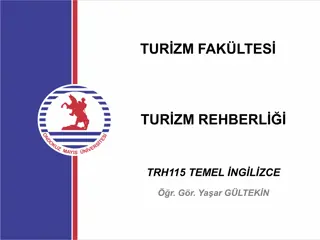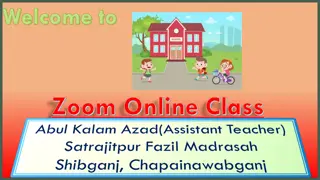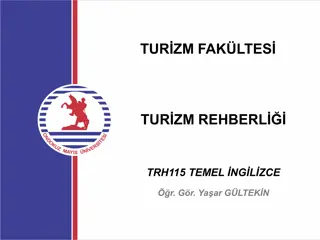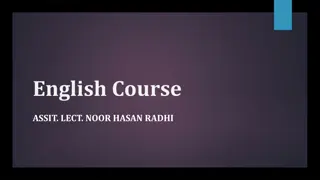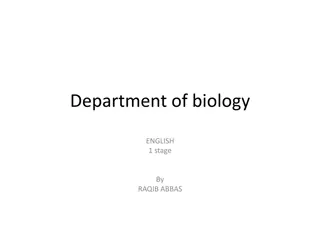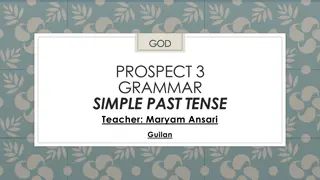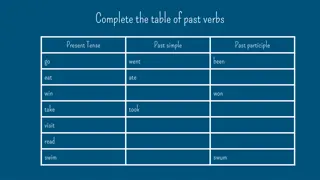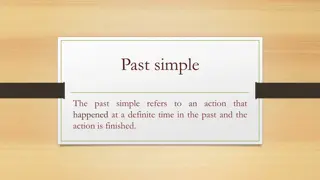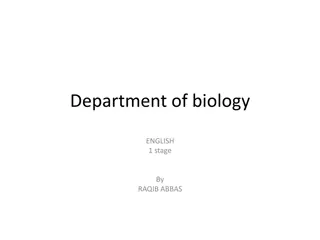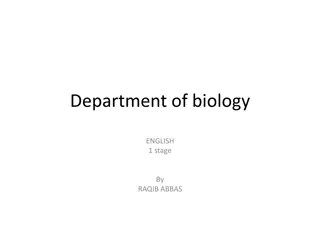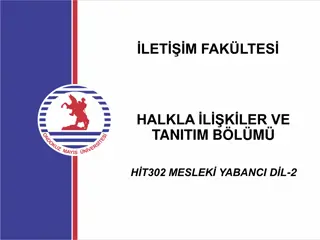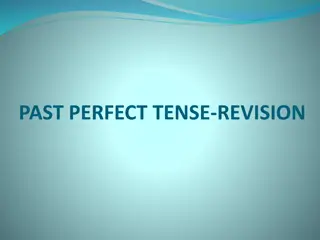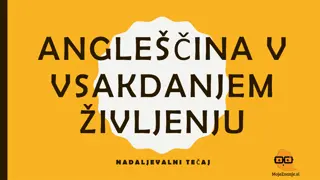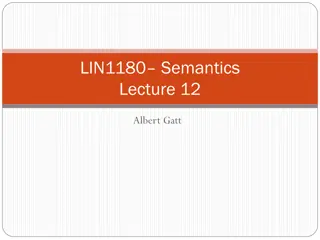Understanding the Past Perfect Tense in English Grammar
The past perfect tense expresses actions that occurred before another action in the past, referring to time up to a point in the past. It is often used in reported speech and formal writing to indicate completed actions before a specific event. The past perfect progressive tense emphasizes the duration of an activity that was in progress before another past activity. Both tenses help in accurately describing past events and their sequence.
Download Presentation

Please find below an Image/Link to download the presentation.
The content on the website is provided AS IS for your information and personal use only. It may not be sold, licensed, or shared on other websites without obtaining consent from the author. Download presentation by click this link. If you encounter any issues during the download, it is possible that the publisher has removed the file from their server.
E N D
Presentation Transcript
Past Perfect Simple The Past Perfect simple expresses action in the past past past. past before another action in the past past. This is the past in the past in the The train left at 9am. We arrived at 9:15am. When we arrived, the train had left had left. The past perfect refers to time up to a point in the past (time up to then), just as the present perfect refers to something that happened in the time up to the moment of speaking (time up to now). You can sometimes think of the p past time is before before. ast p perfect erfect like the present perfect, but instead of the time being now now the I wasn't hungry. I had had just eaten eaten. now They were hungry. They had had not eaten eaten for five hours. I didn't know who he was. I had had never seen seen him before. X X X X "Mary wasn't at home when I arrived." / "Really? Where had had she gone gone?"
Past Perfect Simple The past perfect is often used in reported speech after verbs like: said, told, asked, thought, wondered: He told us that the train had left I thought I had met had met her before, but I was wrong. He explained that he had closed had closed the window because of the rain. I wondered if I had been had been there before. I asked them why they had had not finished finished. had left. The past perfect is often found in more formal writing, such as fiction. The simple past can be used to say that a certain event happened, but then the fiction writer uses the past perfect to explain what had happened before that event: Billy felt great that evening. Earlier in the day, Annie had caught one fish, and he had caught three. They had had a delicious picnic near the lake and they had gone swimming again. It had been a nearly perfect vacation day.
Past Perfect Simple We often use the past perfect to refer to situations which have changed. In speaking, had is often stressed: Are you going anywhere today? I had planned to go to the beach but look at the rain! (had is stressed; the meaning is I have now changed my mind ). I m very happy working as an engineer but I had wanted to be an actor when I was younger.
Past Perfect Progressive Past Past Perfect Progressive Perfect Progressive WE HAD BEEN SINGING Auxiliary HAVE in past tense Auxiliary BE in past participle form Main verb SING in present participle form (-ing) SUBJECT
Past Perfect Progressive The past perfect progressive emphasizes the duration of an activity that was in progress before another activity or time in the past. This tense may also express an activity in progress close in time to another activity or time in the past. It also occurs in reported speech. This tense is used less frequently compared to other verb tenses. The Past Perfect progressive is like the past perfect tense, but it expresses longer actions in the past past before another action in the past past: John started waiting at 9am. I arrived at 11am. When I arrived, John had been waiting had been waiting for two hours. X X X X duration now
Past Perfect Progressive John was very tired. He had been running had been running. I could smell cigarettes. Somebody had been smoking had been smoking. Suddenly, my car broke down. I was not surprised. It had had not been running been running well for a long time. Had Had the pilot been drinking been drinking before the crash? For example, imagine that you meet Steve at 11:00 am. Steve says to you: "I m m angry. I ve ve been waiting been waiting for two hours Later, you tell your friends: Steve was was angry. He had been waiting had been waiting for two hours .
Exercises Make the past Make the past perfect simple: perfect simple: 1. When I arrived at the cinema, the film ____________________ (start). 2. She ____________________ (live) in China before she went to Thailand. 3. After they ____________________ (eat) the shellfish, they began to feel sick. 4. If you ____________________ (listen) to me, you would have got the job. 5. Julie didn t arrive until after I ____________________ (leave). 6. When we ____________________ (finish) dinner, we went out. 7. The garden was dead because it ____________________ (be) dry all summer. 8. He ____________________ (meet) her before somewhere. 9. We were late for the plane because we ____________________ (forgot) our passports. 10.She told me that she ____________________ (study) a lot before the exam.
Exercises 11. The grass was yellow because it ___________________ (not / rain) all summer. 12. The lights went off because we ___________________ (not / pay) the electricity bill. 13. The children ___________________ (not / do) their homework, so they were in trouble. 14. They ___________________ (not / eat) so we went to a restaurant. 15. We couldn t go into the concert because we ___________________ (not / bring) our tickets. 16. She said that she ___________________ (not / visit) the UK before. 17. Julie and Anne ___________________ (not / meet) before the party. 18. I ___________________ (not / have) breakfast when he arrived. 19. He ___________________ (not / use) email before, so I showed him how to use it. 20. You ___________________ (not / study) for the test, so you were very nervous.
Exercises The storm destroyed the sandcastle that we ________________ (build). He (not / be) ______________ to Cape Town before 1997. When she went out to play, she (do / already) ______________ her homework. My brother ate all of the cake that our mum _________________ (make) . The doctor took off the plaster that he (put on) _______________ six weeks before. The waiter brought a drink that I (not / order) ___________________ . I could not remember the poem we (learn) _________________ the week before. The children collected the chestnuts that (fall) ____________________ from the tree. (he / phone) ________________ Angie before he went to see her in London? She (not / ride) ________________ a horse before that day.
Exercises Make the past perfect Make the past perfect progressive progressive positive: positive: 1. 2. 3. 4. 5. 6. 7. 8. 9. 10. It _______________________________ (snow) for three days. I _______________________________ (work) all day, so I didn t want to go out. She _______________________________ (sleep) for ten hours when I woke her. They _______________________________ (live) in Beijing for three years when he lost his job. When we met, you _______________________________ (work) at that company for six months. We _______________________________ (eat) all day, so we felt a bit ill. He was red in the face because he _______________________________ (run). It _______________________________ (rain), and the road was covered in water. I was really tired because I _______________________________ (study). We _______________________________ (go) out for three years when we got married.
Exercises Make the past perfect Make the past perfect progressive or progressive or the the simple past: simple past: 1. 2. 3. 4. 5. I ________________________ (wait) for hours, so I was really glad when the bus finally ________________________ (arrive). Why ________________________ (be) the baby s face so dirty? He ________________________ (eat) chocolate. I ________________________ (see) John yesterday, but he ________________________ (run) so he was too tired to chat. It ________________________ (rain) and the pavement ________________________ (be) covered with puddles. When I ________________________ (arrive), it was clear that she ________________________ (work). There were papers all over the floor and books everywhere. They ________________________ (study) all day so, when we ________________________ (meet), they were exhausted. The boss ________________________ (talk) to clients on Skype for hours, so she ________________________ (want) a break. I ________________________ (drink) coffee all morning. By lunchtime, I ________________________ (feel) really strange. Lucy ________________________ (hope) for a new car, so she was delighted when she ________________________ (get) one. I ________________________ (dream) about a holiday in Greece! I couldn t believe it when my husband ________________________ (book) one as a surprise! 6. 7. 8. 9. 10.
Reading Researchers are working on machine learning systems to identify COVID-19 cases by the sounds of a person s cough. One system has demonstrated a high success rate in detecting COVID-19 in people with no physical signs of the disease. Such a tool could be important in the fight against COVID-19, which can be spread by people who do not even know they are infected. Researchers at the Massachusetts Institute of Technology, MIT, recently published a paper reporting results of the system. The team created an artificial intelligence (AI) model to examine the sounds of people who produced a forced cough. The sounds were collected from people who recorded them on computers or mobile devices. The individuals were also asked to provide information about any symptoms they were experiencing, as well as whether they had been officially tested for COVID-19. People then sent the recordings and data to researchers through the internet or their devices. Researchers reported they had received more than 70,000 recordings, amounting to about 200,000 individual cough examples. The team then trained the model on the cough sounds, as well as spoken words.
Reading When the new cough recordings were fed into the system, it correctly identified 98.5% of coughs from people confirmed to have COVID-19, the researchers reported. The model also detected 100% of coughs in people who reported they had tested positive had no signs of the disease. One of the project s leaders is Brian Subirana, a research scientist in MIT s Auto-ID Laboratory. Subirana and his team had already been developing AI models to examine forced-cough recordings to search for signs of Alzheimer s disease. Such signs can include changes in personality and memory loss, but Alzheimer s can also cause nerve and muscle problems, including weakened speech. The MIT team says its latest model trained to identify Alzheimer s disease from cough sounds had also shown good progress as a possible way to help detect the condition. So when the coronavirus pandemic developed, Subirana told MIT News, he thought the same model structure might work for COVID-19. This is because there was evidence that COVID-19 infected individuals may also experience voice muscle weakness. positive for the virus, but
Reading Subirana said the researchers discovered a striking detect Alzheimer s and COVID-19. The experiment showed that the way a person produces sound changes if they are infected with COVID-19 even if no physical signs are present, he added. The team says it is working to develop a user-friendly app to detect COVID-19 cases. This would make it possible for users to cough into their phone and receive immediate information on whether they might be infected and should seek an official test. The effective use of such a tool could also diminish diminish the spread of the pandemic if everyone uses it before going to a classroom, a factory, or a restaurant, Subirana explained. U.S. researchers at Pennsylvania s Carnegie Mellon University are also using machine learning methods to develop a voice-based testing system for COVID-19. That system also uses recordings of coughs as well as some vowel sounds and the alphabet to identify signatures signatures of the virus, the Pittsburgh Post-Gazette reported. And in Britain, a similar project is being carried out by engineers at the University of Cambridge. Researchers working on that system reported in July they had created a machine learning tool that could correctly identify COVID-19 cases based on cough and breath sounds. Those models performed with a success rate of about 80 percent in laboratory tests, the team striking similarity in the ability of the model to app that could be used on a wide basis


